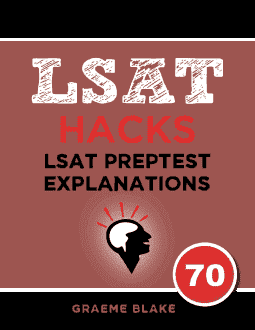This is an explanation for passage 3 of LSAT preptest 70, the October 2013 LSAT – the comparative passage. The passages are about the relationship between money and happiness.
This section has paragraph summaries and an analysis of the passage, links to the explanations for the questions are below.
Paragraph Summaries
Passage A
- Happiness paradox. Richer people are happy, richer societies are not happy.
- Our happiness depends more on the increase in our income than the level of our income. We are not good at understanding this and we over-invest in material goods.
- Rivalry: A study showed that most people would choose to be poor, but richer than others. East Germans are richer than they used to be. But now they compare themselves to West Germans, so now they feel poorer.
Passage B
- Does the Solnick-Hemenway study show that we still seek advantages over our rivals via bigger houses?
- Actually, the data show that richer people feel happier because they’re more successful and feel that they have created more value.
- Two equally successful people will be equally happy, even with different incomes.
- Wanting to be successful is a noble desire, it means that we want to create value. Fortunately, it also makes us happy.
Note: Paragraph summaries get a bit imprecise on some comparative passages. These two passages have 11 paragraphs between the two of them.
Obviously, I don’t keep mental notes on what every single paragraph says. That’s only useful for passages with fewer, longer paragraphs (including some comparative passages).
Instead, these notes represent the main points from each passage. They’re what I retained from each passage before I moved on to the questions.
Analysis
One of your most important tasks on a comparative passage is to figure out the main point of each passage, and how the two passages relate to each other. In particular, you should know where the authors agree and where they disagree.
Both authors mentions a study, the Solnick-Hemenway study. Both authors give their interpretations of the study.
A study has no objective truth. The Solnick-Hemenway merely reported some observations. The fourth paragraph of passage A reports the results of the study. The study found that people would prefer to have a smaller amount of money if they were richer than other people.
The author of Passage A thinks that this means we experience rivalry with our peers. We compare ourselves to others, and want to have more money than them.
Passage B Has A Nicer Interpretation Of The Study
The author of Passage B has a different interpretation. They say that data shows that we actually care about being successful (second sentence of the second paragraph). It’s true that people with money often feel more successful (2nd & 3rd line of the third paragraph), but this is just a correlation. It’s the success itself that makes us feel happy (second sentence of the third paragraph).
Further, we have a noble reason for wanting to feel successful. When we’re successful, it’s usually because we created value for others. So really we want to feel like we’ve made contributions to society. (From the last sentence of paragraph three to paragraph four of passage B).
So, Passages A and B agree that the study is worthwhile. They disagree on how to interpret the study, and whether rivalry is noble or ignoble.
Only Passage A Talks About Habituation
Passage A also talks about habituation – a topic ignored in passage B. Habituation means that we get used to additional income. If you move from $40,000 to $50,000, you will be happy, for a time. But then you’ll get used to $50,000. It will feel ‘normal’. You’d have been just as happy at $40,000, and you’d probably have had more leisure time.
We’re not very good at understanding this. So we keep chasing after money, even though it doesn’t make us happier (the third paragraph of passage A).
The questions completely ignore the phenomenon of habituation, possibly because only one passage deals with it. This doesn’t mean you should ignore something that is only talked about in one passage – that information can give you clues about the author’s attitude. Still, a topic is more likely to be useful on comparative passages if it’s mentioned in both passages.


Leave a Reply